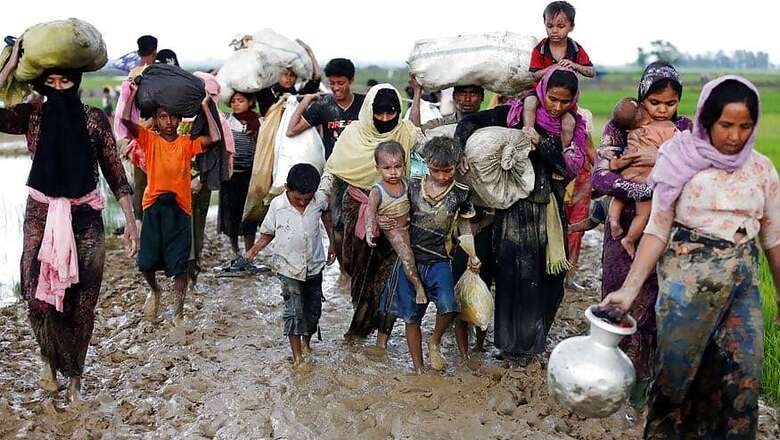
views
The Rohingya issue has become a massive humanitarian crisis with over 4 lakh people fleeing the areas along the Myanmar-Bangladesh border. They started taking refuge in the neighbouring countries, mostly through illegal means.
The crisis has unfolded at a time when India and Myanmar are working towards building a strong relationship, especially after PM Narendra Modi’s three-day visit to the country last week, where he committed to help Myanmar in its nation-building process.
What had started off as an internal ethnic-cum-political problem has now started spreading its tentacles into the other South Asian countries, particularly Malaysia, Thailand, Bangladesh, Vietnam and India.
After the Rohingya Muslims started revolting against the Myanmar military, majorly due to excessive human rights violation, the government branded them as a militant outfit. Due to this stance of the Myanmar government, other countries in the region also started viewing them as a terror group that is fighting for a separate nation.
For India, it’s not about intruding into Myanmar’s private affairs, but to execute and make PM Modi’s ‘Act East’ policy a success. India stands out from the rest of the countries in South Asia as one of the strongest and most stable (in terms of absence of any kind of uprising). At this time, all eyes are on how the Modi Government is planning to extend help or find a solution for the Rohingya issue.
Globally, India is seen as a benevolent nation that has a history of giving refuge to people since Jawaharlal Nehru’s time. India has been providing assistance to the Tibetans as well as thousands of refugees from countries such as Afghanistan, Sri Lanka, Pakistan, Bangladesh and even 50,000 Rohingya immigrants from Myanmar.
From geo-political, economic and strategic angles, Myanmar holds an important place in India’s blueprint for becoming the major power in Asia. Hence, it’s necessary for the present government to take any step with extreme caution.
The present situation in Myanmar has put India in a fix, and it has become very difficult for PM Modi to decide whether to interfere or not.
Notably, home minister Rajnath Singh on Tuesday indicated that some action will be taken with regard to deportation of Rohingya refugees, who the government considers to be a security threat, particularly in Jammu & Kashmir.
Rajnath, when asked about the government's stand on deportation of Rohingya Muslims from Jammu, said, “We cannot rule out the possibility of a security threat and I have already cleared our stand with regard to illegal immigrants.”
Additionally, Minister of State for Home Affairs, Kiren Rijiju, had on September 5 said that Rohingya Muslims were illegal immigrants and stood to be deported.
Another reason why India can’t ignore the Rohingya crisis is due to economic reasons. Stability in the region where Rohingya Muslims predominantly live – Rakhine state – is extremely important for India’s economic investment plans. During PM Modi’s recent visit to Myanmar, he stressed on the need to work toward socio-economic development in the state by taking up projects.
The turmoil in Rakhine state is adversely affecting the Kaladan multi-modal transit transport project, which aims to build a transport corridor and connect India’s northeast with Myanmar. Hence, it’s very important for India to ensure that peace returns to the conflict-torn part of Myanmar so that it can execute its planned projects in time.
Apart from economic and humanitarian grounds, strategic reasons also can’t be overlooked when it comes to India and Myanmar. India, at this juncture can’t afford to have strained relations with Myanmar, especially when PM Modi is striving to grow India’s influence in South Asia.
In such a situation, it makes sense for the Indian government to support Myanmar leader Aung San Suu Kyi, but it should also make her understand the importance of addressing the problems of Rohingya Muslims and Rohingya Buddhists and working towards resolving the present crisis.














Comments
0 comment